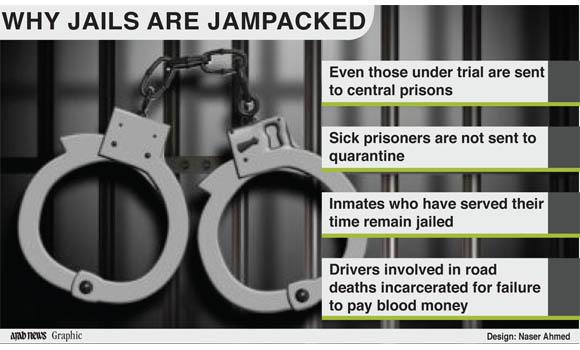
Jeddah, May 17: Prisons are experiencing overcrowding due to an increase in the number of inmates and a delay in releasing inmates who have completed their sentences, the Kingdom’s prisons department chief has said.
The number of prisoners in central jails in Riyadh, Makkah and Jeddah is now nearly three times their capacity, local media reported quoting Maj. Gen. Ali Al-Harthi.
“The problem has been caused by a failure on the part of the Ministries of Justice and Health, as well as immigration officers and prosecutors, to cooperate with us. They have not taken any measures to ease the pressure on prisons,” he said.
“They continue to send to jail those who have not been sentenced yet and refuse to send those who are ill into quarantine to avert the spread of infection. In addition, many prisoners whose jail terms have expired also still remain in prison.”
Al-Harthi said around 6,300 inmates are currently serving time in Riyadh’s central prison even though the prison can accommodate only up to 1,800 people.
There are also 2,500 and 7,400 inmates at the central prisons of Makkah and Jeddah although they have a maximum capacity of 700 and 2,000 respectively, he added.
A large, modern and spacious prison is being built near the Makkah-Jeddah Highway, set to be the largest in the Kingdom.
Saudi Arabia is planning to integrate an electronic system that connects prison departments with prosecution offices and judiciaries in order to expedite the process of being released on bail or sentencing inmates. A significant number of expatriate workers are languishing in various prisons for road traffic accident-related death, forgery in residency permits and other crimes.
Some of them have completed their sentences but there are delays on the part of the judiciary and sponsors in processing paperwork for release, said Naaz Vokkam, who regularly visits Dammam central prison.
Echoing these views, Mohammed Saleem Basha, an Indian driver who had spent seven years in the Faraj and Khamis Mushait prisons in the southern province and who was released by King Abdullah for paying blood money, told Arab News that prisons in small cities where he had served his sentence are spacious and satisfactory.
According to a report, 47,000 prisoners are lodged in various prisons in Saudi Arabia, of which 23,000 are Saudi, while 24,000 are expatriates. Of the expatriate inmates, 2,158 are Pakistani, 1,691 are Indian, 1,046 Bangladeshi and 1,400 Egyptian.
Foreign diplomatic missions conduct regular visits to prisons. Visitors are also allowed to meet inmates two days a week without mobile phones and any objects inside dress pockets.
Inmates are allowed to continue their education and enroll for vocational training such as electrical repair, plumbing and computing, among other vocations. Inmates are also allowed to pursue sports activity inside the prisons.
All prisons are equipped with hospitals and medical facilities.
Royal pardons granting release are usually implemented during the month of Ramadan. Release can also be contingent upon the memorization of the Qur’an and good conduct.





Comments
Add new comment